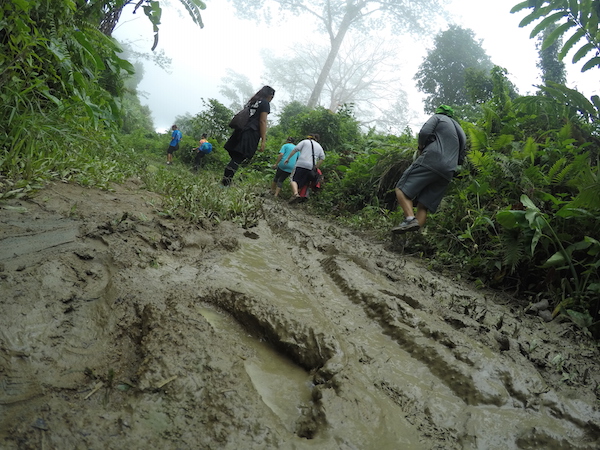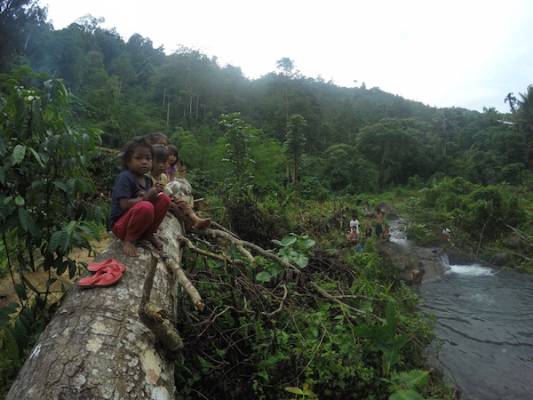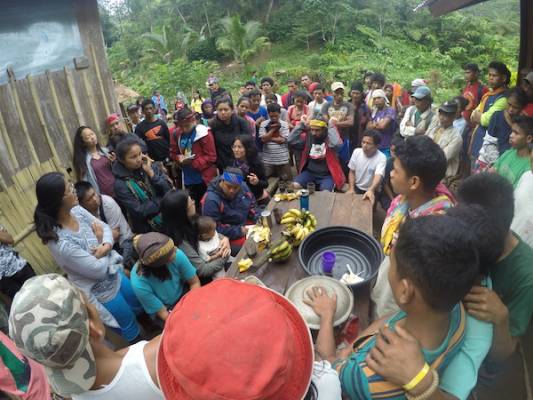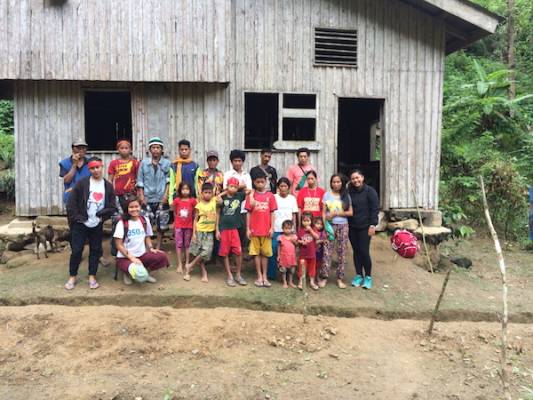Last week, 350 Pilipinas coordinator, Zeph Repollo, was part of an international solidarity mission to a remote village of the Dulangan People in Mindanao, Philippines.

Photo credit: 350 Pilipinas
I’m writing this note from the lush, forest-clad Daguma Mountain Ranges of Mindanao, Philippines, where the indigenous Dulangan People are in a dangerous struggle against logging and mining corporations encroaching their land. Twelve of these companies are part of the logging conglomerate David M Consunji, Inc (DMCI) The Dulangan people, who have lived here for centuries, are at risk of not just losing their land, but also their life, culture, and identity that is deeply connected to the forests of the Daguma Range.
I’m part of a delegation of 33 people from the US, Palestine, Philippines and nearby local communities who have come to hear the stories of the community and help shine a light on the encroachment of DMCI over their ancestral land. After setting off from my home in Negros Oriental, I landed in Cotabato City, from where it took a whole day and a half to reach the Dulangan settlement. It was a combination of a skylab motorcycle (habal-habal) traverse and mountain trekking through the ridges and rivers. A warm Dulangan welcome awaited as we arrived.
After some food and a tour of the village, we were gathered in their chapel to hear some of the stories from Datu Samuel, who is the spokesperson of Kesasabanay Dulangan Manobo (KEDUMA), an organization of the Dulangan Manobo:
“Since Consunji entered our domain, we lost our right to our own land. They told us that it is legal. When was it legal to steal land from the Dulangan, Manobo, Teduray, Tboli, and Moro?”
There’s history here. The struggle against private logging companies has its roots in the Spanish colonial period who began logging our forests for lumber. But it was during American colonial rule that logging in Mindanao scaled up considerably. In the reconstruction period after the Second World War, more and more foreign and local logging companies swarmed into this part of Mindanao. On top of being important for the livelihoods of the indigenous peoples, the rainforest in this area is also significant for its diversity of plant and birdlife.

Photo credit: 350 Pilipinas
In the 1970s, David Consunji consolidated most of the logging companies in the Philippines under one company: David M Consunji, Inc. (DMCI). Under this conglomerate Consunji, a close crony of the despotic President Marcos, rapidly dominated construction and logging ventures in the country.
The Consunjis have consistently used armed force to assert control over their staked forest territories. This has driven the Lumad and other residents to the mountains. By use of force they silence any form of resistance against their corporate interest.
“One of our leaders, John Calaba, was shot last April 30, 2015, others are assaulted and threatened. Our homes have been burned and our crops have been slashed down. We will not allow the Consunjis and their military to reign over our ancestral land. They must pay for the crimes they’ve committed to our people.” said Datu Samuel, of KEDUMA.
Not only does DMCI do logging, but it also owns gold and coal mining concessions, which are impacting the T’boli tribe in Ned, South Cotabato, a province neighboring the Dulangan settlement. As one of the Tboli Spokesperson said,
“We do not agree with coal mining. It damages our own lives, and our livelihoods. We are saddened about how the government quickly pays attention to the needs of mining companies, but are very slow, if they respond at all, when we Lumad are the ones in need.”

Photo credit: 350 Pilipinas
The need for support and solidarity with the frontline struggles of communities like the Dulangan is very real. People at the forefront are being harassed, intimidated, and murdered for simply trying to stop corrupt mining and logging companies from running roughshod over their own land. To date, there have been 92 cases of extrajudicial executions across the Philippines linked to defending our communities and environment.
After our visit to the Dulangan people, we made the long journey onwards to Davao City, for the International Conference of People’s Rights in the Philippines, in commemoration of the 40th anniversary of the Universal Declaration on the Rights of the People adopted in Algiers. The conference seeks to uphold the Declaration’s progressive principles and aspirations today where people’s rights are gravely threatened. The multiple crisis besetting the world’s capitalist system did not lead to its demise but has opened opportunities for it to take on new and more violent forms.
More than 400 participants gathered in this conference coming from people’s and social movements, faith-based organisations, the academia, and human rights organizations from different parts of the globe. Participants recognize the need to reassert our commitments to support and defend people’s rights, justice, and peace in the Philippines, and strengthen ties of solidarity and resistance between the Filipino people and people all over the world.
In the height of escalated resistance of people across the world, what does solidarity mean? To share the words of Prof Camilo Perez-Bustillos, Executive Director of the Human Rights Center in the University of Dayton during the conference he said,
“Over a hundred years ago, it was well understood that the struggle for independence and liberation of the Philippines, Cuba, and Puerto Rico from both Spanish colonialism and the menace of US colonialism and imperialism were completely intertwined and interdependent. So now, we must understand and come up with a shared vision of global liberation which will not be complete until each one of us is free.”
The struggle for climate justice is a struggle of the world’s people for social justice. It is a struggle for economic and development rights. This is deeply connected to several social justice issues confronting the world’s oppressed and exploited class. During the conference we heard about the people’s assertion to land in Kompung Dadap Indonesia, the school teachers in Pakistan protesting against privatization, workers in Shuangyashan, China, demanding for the wage owed to them by the mining company, mass gatherings in Osaka Japan against military bases, women in India fighting for their land being declared by their Government as “wasteland” and giving authority to coal fired power plant corporations, the struggle in Palestine against Israel’s dumping of chemicals and pesticides in their communities that poisoned children and their entire community.

Photo credit: 350 Pilipinas
As climate activists, our role is not just to count carbon dioxide emitted to the atmosphere but to address the roots of the climate crisis which is interconnected and intertwined to the global economic system, a system that is breeding violence, plunder and oppression on the world’s exploited people. As the Filipinos say it, “makibaka, ‘wag matakot!” which means “fight, don’t be afraid!” for we have nothing to lose but our chains!
My journey continues to the House of Representatives in Manila joining 40,000 people marching on the streets to challenge newly elect Rodrigo Duterte for national and democratic change, achieve peace based on justice, and carry forward the people’s agenda for change. An expression of our reaffirmation to the comprehensive and indivisible character of people’s collective rights as expressed in the Algiers Declaration.
Pangiyaki! Padayon!
